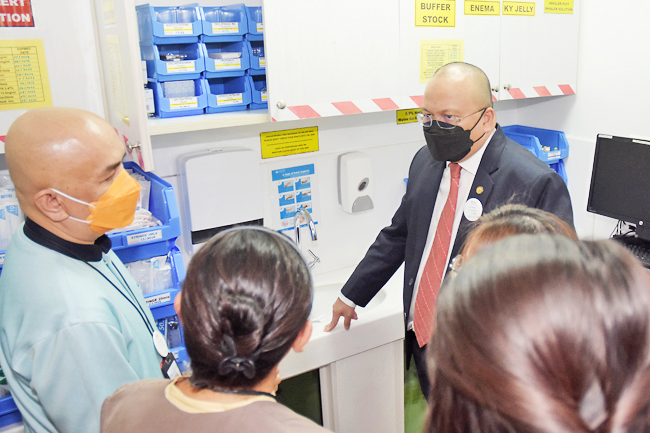James Kon
It is imperative that those involved in healthcare, especially in dealing with medication, refrain from perpetuating the finger-pointing culture when a medication error occurs.
Instead, there is a need for ethical behaviour and moral values in all healthcare professionals to pave the way for a proactive approach to fostering a “patient safety first” mentality.
This was said by Minister of Health Dato Seri Setia Dr Haji Mohd Isham bin Haji Jaafar in a speech yesterday to mark World Patient Safety Day at Raja Isteri Pengiran Anak Saleha (RIPAS) Hospital.
“Given that medication error is one of the primary causes of preventable deaths, a better solution is urgently needed to prevent mortality and morbidity,” he said.
He underlined that knowing the type or the extent of medication error “is not enough. Our experience tells us that it is difficult to produce accurate and reliable data due to under-reporting of incidents”.

As such, the minister believed in encouraging the detection of errors in the system to ensure continuous improvement in healthcare.
“Please speak up when you see medication errors or patient safety issues,” he urged at the event.
According to the World Health Organization (WHO), medication error makes up 50 per cent of all preventable harm in healthcare, while the annual cost associated with medication errors globally is estimated at USD42 billion, he said.
“Medication errors occur when there is a weak medication system, or the presence of human factors, such as fatigue, poor environmental condition or staff shortage, which can then result in longer hospitalisation, harm and even death,” said the minister Dato Seri Setia Dr Haji Mohd Isham cited the COVID-19 pandemic and the challenges and opportunities presented during the period.
“Health authorities around the world were confronted by scepticism when vaccines were administered and purported as a solution to living with COVID-19. But at the same time, the pandemic showed the resolve and will of governments and peoples through an increased understanding and acceptance of risks association with medication,” he said.
Due to physical contact restrictions during the pandemic, the healthcare system was “forced to innovate, review and enhance how we practise medicine”, and as a result, “put the onus of healthcare back to the patients, resulting in a more aware and responsible population”.
To ensure proper medication management and safety, he said hospital wards across the Sultanate are urged to learn and implement the International Patient Safety Goal of medication safety as an impetus and catalyst for change.
The RIPAS Hospital Patient Safety Unit, with guidance from the Ministry of Health Patient Safety Office, has designated two wards at RIPAS Hospital as the model wards for medication management.
The minister also shared plans to standardise the medication storage nationwide in response to incident reports that have been submitted to the Patient Safety Office.
“With standardisation and colour-coded inventory in mind, we hope to avoid errors during the dispensing and preparation of medication,” he added.





